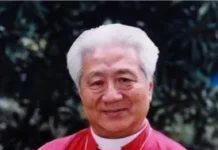
With the 20th National Congress of the Communist Party of China (CPC) being held in Beijing on October 16-22, the magazine “China Religion” rolled out a special topic named “Religious Work in the Past Decade”, inviting Party and government leaders, representatives of religious circles, and representatives of religious research teams to contribute articles on the topic.
In the ninth issue of “China Religion” in 2022, Xu Xiaohong, chairman of the Three-Self Patriotic Movement (TSPM), wrote an article “Ten Years of Sharpening a Sword: Continue to Deepen and Realize the Sinicization of Christianity”, which was also released on October 3 by the WeChat account of SARA (China’s State Administration for Religious Affairs).
Xu mentioned that the term “Sinicization of Christianity” in the writings of Tsu Chen Chao (a Protestant theologian) and Timothy Ting-fang Liu (a Protestant educator), was more viewed from the standpoint of missionary and apologetics.
In the 1980s and 1990s, Bishop K. H. Ting once again put forward the concept of “adapting Christianity to the socialist society”. He said, “We insist on the Sinicization of Christianity, in other words, it should be localized… Because as far as the church is concerned, the Three-Self Patriotic Movement (TSPM) advocates the sinicization of the church which will be more Chinese, just as the British church and the American church have their own characteristics.” So the TSPM was also considered as part of the effort to sinicize Christianity, Xu added.
Xu summed up the “three characteristics” of the Sinicization of Christianity: modern nature, leading power, and cultural nature. He advocated that the “stigma of foreign religion” should be constantly eliminated in China’s Christianity, which could realize its true “self” theologically.
To support China’s churches’ persistence in the direction of Sinicization, CCC&TSPM decided to conduct seminars around different themes every year, such as “Commemoration of the 100th Anniversary of Bishop K. H. Ting’s Birth and the Seminar on the Sinicization of Christianity”, “Remember the 500th Anniversary of the Religious Reform and Seminar on the Sinicization of Christianity”, and “Commemorating the Centenary of the Publication of the Chinese Union Version Bible (CUV) and Discussing the Sinicization of Christianity”. Making explorations in the faith practice and forms of expression, Pastor Xu and Rev. Kan Baoping, vice president and director general of the China Christian Council (CCC), edited the book Holy To the Lord—A Glimpse of Chinese Church Architecture published in 2015, introducing modern churches and churches incorporating Chinese element churches or in ethnic style. In recent years, CCC&TSPM has compiled a sinicized hymnal and revised a catechism pamphlet.
Xu once formulated the “Outline of the Five-Year Work Plan for Promoting the Sinicization of Christianity in China (2018-2022)”, which aimed to clarify the significance, basic connotations, goals, and tasks of localization of Christianity and how to promote the process.
He said, “This year, we will continue to formulate the next five-year Sinicization plan which is problem oriented. On the basis of the past five years’ experience, we will strive to break some bottlenecks in work to innovate work ideas and methods.”
“It is an important task to incorporate the theological thoughts and the results of the seminar on the indigenization of Christianity into sermons which have been compiled into volumes by CCC&TSPM. In addition to strengthening the construction of the preaching team for the Sinicization of Christianity, CCC&TSPM has published five volumes of sermons from preaching exchanges.”
With the propaganda groups being established in most provinces, autonomous regions, and direct-administered municipalities of China, CCC&TSPM has strengthened the training of pastoral staff in ethnic minority areas.
“In the future process of developing Christianity in the Chinese context, besides the in-depth study of Bishop K. H. Ting ‘s treatises, CCC&TSPM is engaged in compiling and publishing the articles on sinicizing Christianity by Tsu Chen Chao, Wu Leichuan (a leading Chinese theologian), Timothy Ting-fang Liu, Cheng Ching-yi (a Chinese Protestant leader), Zheng Jianye (Chinese Anglican bishop), Bishop Shen Yifan, and Chen Zemin,” Xu concluded.
– Translated by Abigail Wu


